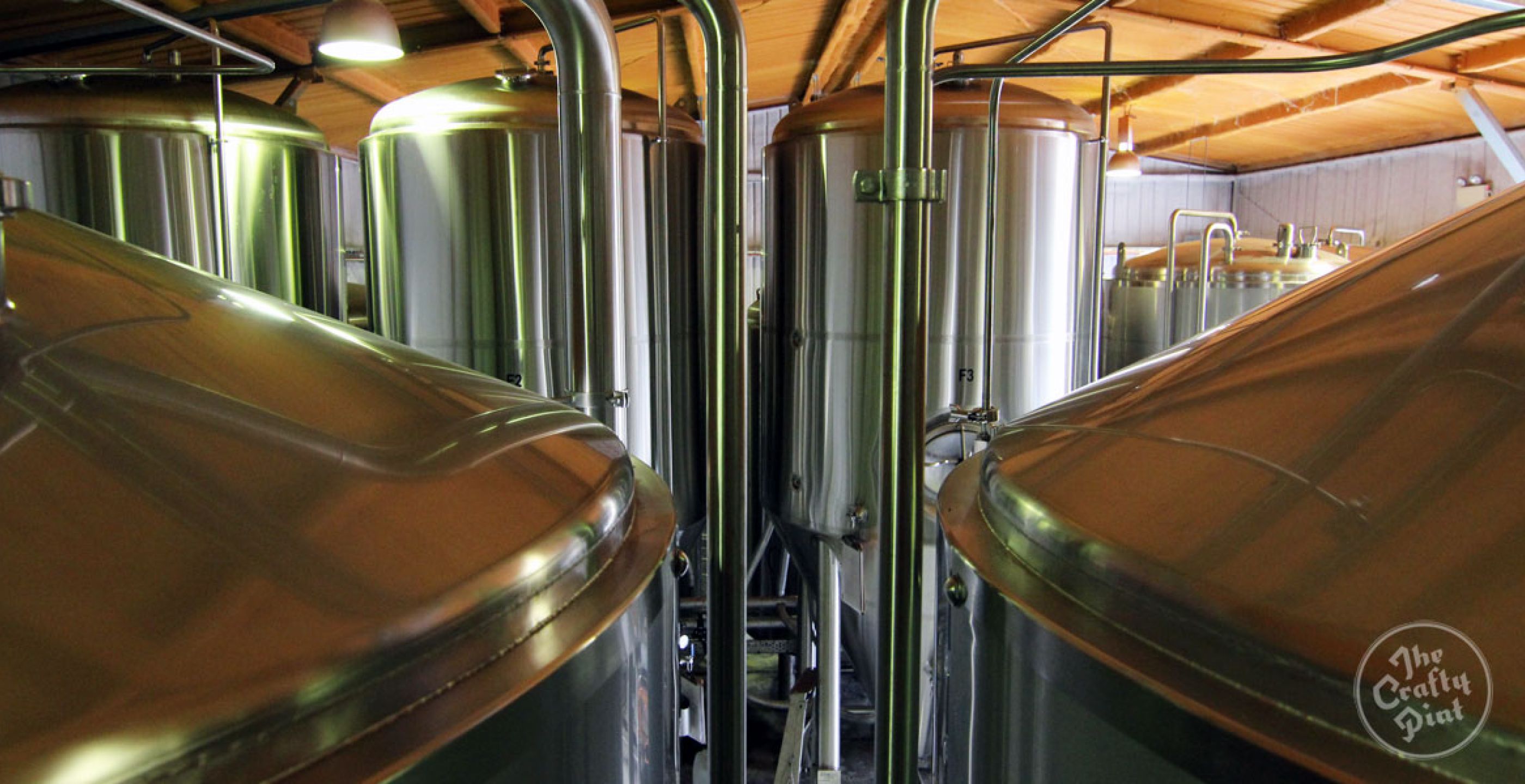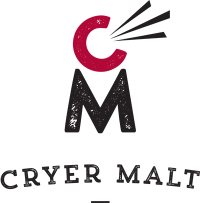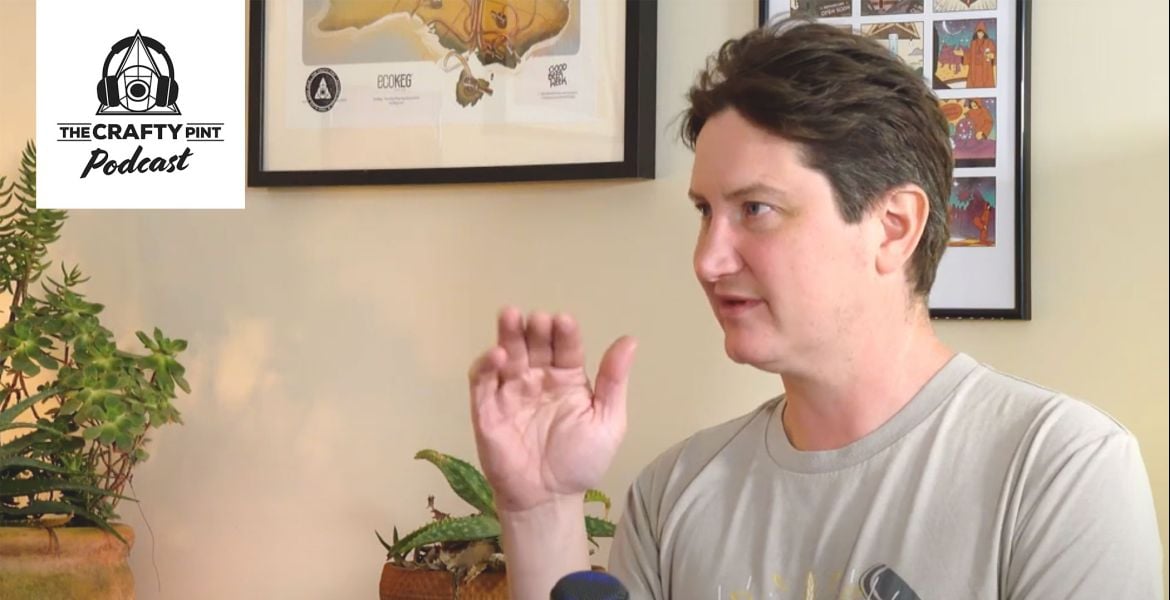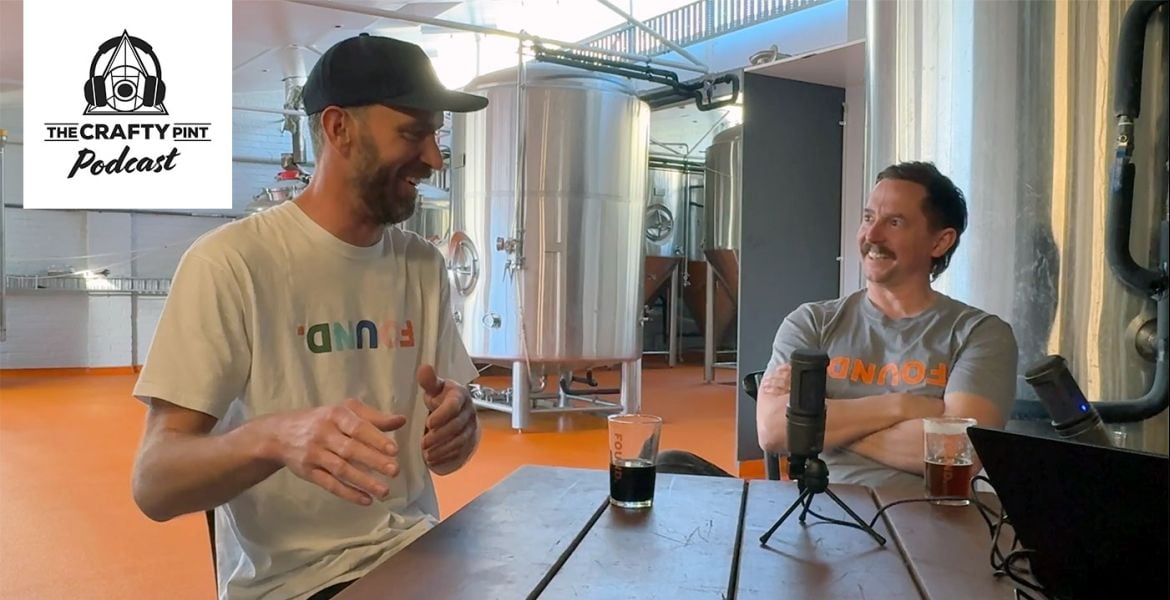More people than ever are hoping to open their own brewery or brewing company in Australia. But turning a dream into reality isn't easy; in fact, it's bloody hard work. What's more, there are so many things to consider aside from whether you can brew a good beer and come up with a cool name for your business.
During Good Beer Week 2016, The Crafty Pint will be hosting a brewery startup panel in the Cryermalt Trade Hub, upstairs at the Festival Hub, Beer DeLuxe Fed Square.
Register your interest for the session here
Before then, however, we thought we would revisit a topic we last addressed in a four-part series following Boatrocker's journey from contract brewer to owner of its own stainless steel.
This time around, we're doing it in two parts. On day one, we're presenting the top tips from five Australian brewers: two who have just entered the game, one gypsy brewer and two with serious miles on the clock. For part two, we've asked experts from other areas of the industry for their advice for brewers: a rep; an equipment supplier; a brewery offering contract space; a bar owner; a lawyer; and an ingredient and keg supplier.
Over the two articles, any prospective brewers will gain insight, find a few things to add to their checklists and see what those already in the industry feel are the most important factors to address. Every piece of advice over the two days comes from people walking the walk who want you to succeed just as much as they hope to themselves.
The New Brewers
Dereck Hales, Bad Shepherd

Dereck is the home brewer turned pro brewer who opened Bad Shepherd Brewpub with wife Diti in Cheltenham last year. His advice is for prospective brewery owners, rather than just brewers.
1. Most importantly, know what your brand is about and why your business will exist. Consumers need to understand what you’re about if they’re going to choose to try your product. It’s a cluttered market and you need to be able to stand out.
Start from a point of purpose: Why do you want to run a brewery? Why are you selling your beer? For us, we believed that there was an opportunity to serve great tasting craft beer to consumers where there were no similar alternatives, in a relaxed brewpub environment matched to slow cooked BBQ smokehouse foods. And, specifically, we wanted to let people enjoy themselves and disappear from the stresses of life for a while through our product and experience.
In the end, that became – “Beer. The way it should be.” For you, your purpose could be entirely different. But if you don’t know why you’re doing it, how could your consumers ever know?
2. Understand your permit and license requirements thoroughly. Local city councils, especially, can cost you critical months and even years before you get going. Zone classifications and the council’s interest in supporting your endeavour can be a huge benefit or hindrance. I’d recommend to engage local councils as you start your search for a location. Some councils are materially more supportive than others and all will still defer to zone classification rules. The more you chat with regulatory bodies before you lock anything in, the better things will be – trust me!
Here’s a quick summary of permits you’ll require almost regardless of your brewery set up and location:
- Local city planning permit / Development Approval (DA)
- State liquor license
- Building permit
- Waste water agreement
- Australian Tax Office permission to manufacture alcohol
3. Engage other breweries for advice and support. Craft beer is an exceptionally inclusive community and most other brewers will be happy to repay the support they received in getting going. There are heaps of hurdles that you just won’t know about until you get started and they can give you some direction.
4. Spend the time early on doing your sums and evaluation of your business model. Go to other breweries and read as many books on brewing / starting a brewery as well as discussions on places like probrewer.com. Research, research, research. If you’re clear on what your business plan is based upon financially, you’ll be far more eyes wide open starting your business.
Oh, and in your business plan – BE CONSERVATIVE. There will always be things you hadn’t considered or expected that will come up. Cash flow is key and you need to have a war chest when you enter the ring.
5. Spend less time labouring over your perfect recipe and spend more time considering what will appeal most to your target consumer while also having a point of difference from other beers in market. If you want to brew professionally, it’s not about you. It’s about what people want to drink and why they should choose your product.
6. Lastly, don’t be afraid to admit what you don’t know and surround yourself with people that make up that knowledge or skill gap. You need to understand everything generally but you don’t need to do everything yourself. In fact, surround yourself with people that not only have that skill / knowledge but would do it better than you anyway. And for a brewery owner that may just be hiring a brewer. You’ll need to be across so many things, owning a brewery might mean you need to have someone else actually brew for you. That’s tough to hear, but it just might be necessary.
Ryan Davidson, Little Bang Brewing

Ryan (above left) and fellow brewer Fil Kemp (above right) started Little Bang Brewing out of an Adelaide garage. Earlier this year, they opened the doors to their bigger new home, where they combine brewery with bar.
1. Make sure you are utterly in love with craft beer and the industry, because you're going to be working many, many, many hours for not a lot of money. If you want to get rich, seriously consider a different profession. Immerse yourself in the whole process, from recipe design to the brewing itself to marketing and distribution. All parts of the process are essential, and you should get very familiar with all of them, like right now. If you can do any of these things yourself, then you should. If you can't, then you should probably learn.
2. By all means save money, but don't skimp on ingredients or your brewing process. Save money everywhere else if you can, but keep the quality of the product sacred. Actually, make the beer that you, personally, actually like, and brand it the way you'd like to see beer branded. Make the beer that YOU would buy. That's all. Don't read a generic textbook on Marketing and Brand Identity, don't try to second guess the craft market or "premiumise" a sub-standard product. If you love craft beer then you are your own target market, and you know that we can smell bullshit a mile away.
If you're a bit weird and you don't fit the mould, all the better. That said, do try to be honest with yourself, don't throw just any idea out there. Find some friends who'll give you honest feedback, whose opinions you respect, and listen to them. If you think you can do better with an idea then you probably can.
3. Get a mentor (or more than one). Find some local brewers that you respect, go to their place and buy their beers. Make yourself useful if you can (and make sure they actually want you helping), and ask them ALL the questions. Find out what mistakes they made and how they'd do things differently if they had the chance. Keep buying their beers while you listen to their answers, because that info will save you serious time and money.
4. Don't underestimate the Retail Element. Personally selling the beer you make directly to the public is awesome, and you should do it as much as possible. Here's why:
- The margin is great. It's more work, but you make great money on the stuff you sell direct. Just be careful to check your wholesale customers' retail prices for your products, and try not to undercut them; they HATE that.
- You get paid IMMEDIATELY. Here's your beer, and here's your cash. Just like that. Not in 14 days, or 30-days-from-end-of-month, or never-if-we-can-get-away-with-it. Right away. Money in the bank every time you open, it's a really good thing.
- You get to present the beer exactly as you want to, and treat it the way you'd like it treated.
- You get to meet the public face to face: best marketing ever. Tell them your story, and listen to their opinions. These wonderful people love this stuff enough to hang out in a stuffy old warehouse all afternoon. Their feedback is invaluable, and you'll probably make some good friends.
5. Here's the boring part: get to know your spreadsheets. Forecast EVERYTHING. Yes, it's an amazing beautiful industry full of love and excitement, but for Christ's sake make sure you're profitable. Figure out ALL of your costs, as accurately as possible, and when you're done add 15 percent, because you're definitely forgetting something. In all cases prepare for unexpected costs and nasty surprises, then at least if you're wrong it just means you'll make a better profit.
If you're unsure (and you can't be sure until you've got at least a few months worth of data) set the price a little higher. No one ever complained about a price drop, but it's very hard to raise prices if you suddenly discover you're not making a profit. You may want to see your six-pack on the shelf for $20 or less, but the marketplace has a funny way of settling right at the point where the big guys, with all their cash flow and economies of scale, squeeze the little guys out on price. If the beer is good, and the product is honest, people will pay whatever it costs to support you. We certainly hope so, anyway.
The Gypsy (or cuckoo)
Darren Robinson, Doctor's Orders Brewing

Darren is one of the original gypsy brewers in Australia (although prefers the term "cuckoo"). The first Doctor's Orders beer was brewed at the then Schwartz Brewery at the MacQuarie Hotel in Sydney in 2009, since when they have been brewed Hunter Beer Co, The Australian Brewery, Young Henrys, Bridge Road Brewers, Willie the Boatman, Bacchus Brewing, Wheaty Brewing Corps, Big Shed Brewing, Nomad Brewing and Riverside Brewing.
Then there have been collaborations with some of the above plus Sixpoint, Yeastie Boys, Funk Estate, Bacchus and Atom Beers and a handful of other brews either as broader collaborations or with the Local Taphouse Ale Stars. In short, he gets about...
1. Point of Difference. You will never be able to compete with larger craft brewers or even macro breweries in all aspects of the beer industry. Your gypsy brewing company will be judged in the market based on the products you produce and the brand you build around them. You will need to work out where you fit in the industry, who your target audience is, and how you will differentiate your offerings to get your "share of throat”.
2. You’re a small business owner. You will likely be getting into this industry based off an initial vision of producing fine beverages for consumers. Producing the actual product is the focus of all new entrants to the industry and building the brand associated with it. In reality, yes, you are a producer / manufacturer but you are, more importantly, a small business owner. You will likely have a very good grasp on designing and brewing beer (on a small scale at least).
That is the easier and more exciting part. The running and managing a small business and interacting with the hospitality industry is another world and usually a different vertical to what you current / previous day job is / was. Managing accounts, debtors, creditors, compliance registrations, business activity statements, annual reports, etc on the business side. Managing the manufacturing process, the artwork, packaging, transport and logistics, marketing and events on the product side.
3. Reflection. Always be analysing and evaluating your place and your brand in the market. The industry is evolving quickly and what worked well two years ago is different to today. At the very least, have a plan for the calendar year on what you are looking to achieve and how you are going to achieve it, keeping in mind changes you need to make to remain relevant.
4. Relationships. This industry is all about relationships. Relationships for gypsy brewers are even more important as you don't have your own production facility. You are leveraging someone else's and the relationship you have with them will determine your continuing ability to utilise their excess capacity or for them to fit you into their schedules as they grow their business.
Also, the relationship you have with your accountant and how you can manage your small business. The relationship with your graphic artist and photographer (and, no, you can't do that yourself unless you are a graphic artist or photographer) to produce the look and feel of your product in the timeframes required.
5. Have a Brand Strategy. Understand what your brand is and what it means to you, but more importantly how you want it to be interpreted by your customers. Keep the branding of your products and your communications on brand. You'll be surprised what your customers remember and how they make associations between products and brands.
The Veterans
For the two brewers we approached who have been brewing for more than 15 years, we asked them for the top five things they wished they'd known when they were starting out.
Paul Holgate, Holgate Brewhouse

Paul and Natasha Holgate started their brewing company, Holgate Brewhouse, in the back of their house in 1999. They spent years building the business in a market that didn't understand craft beer and while starting a family and working other jobs.
They later took over a hotel in Woodend that now houses their brewery as well as a bar, restaurant and accommodation. The continue to innovate (just wait until you can get your hands on their new Flanders Red – oh boy!) and have stuck resolutely to their guns, producing every beer in house and keeping their family as their number one priority, whatever the demands of their beer business.
1. That excise wouldn’t change in a hurry.
2. That a successful business is more linked into the success of a business's marketing and branding than how good the business's beer is.
3. It’s a hard hard slog on your own… Having start-up funding to employ more people in sales in the early days is important, or, alternatively, more equity stakeholders to share the roles and burden.
4. That you’d be below the average wage earner for a long period of time.
5. That running any small business for many years requires a LOT of energy and is very draining. Make sure you’ve got the passion and energy for the long haul.
John Stallwood, Nail Brewing

John launched Nail back in 2000, five years after registering the trademark for his home brew and first commercial release, Nail Ale. Since then, he has played a key role in the development of the microbrewing industry in WA, helping get the state's brewer's association off the ground and assisting a number of other brewers.
He has also overcome a life-threatening injury after he was king hit and ended up in a coma for three weeks. After recovering, he rebuilt Nail, initially using other people's brewing equipment before, in 2012, forming Brewcorp with Feral and effectively embarking on Nail Brewing Mk III.
Here, he offers his (Feral Brewing-ribbing) advice based on what he learned when initially launching Nail in 2000 and also his more recent experiences.
Starting Nail Brewing in 2000
1. Education. Back in 2000, everyone drank lagers. I did a lot of testing at the University of Ballarat with 40 batches and had a good understanding that people liked lagers not only because of the lesser flavour, but also the light colour, lower bitterness and alcohol.
So Nail Ale was developed originally as a hybrid of lagers and traditional old world traditional craft beer. I didn’t realise that, even though the majority preferred the lager characteristics, how negative some people were to a beer not being a lager. I would get comments like: "This isn’t beer" and "You make money from selling this?" I didn’t realise that the market I was targeting was non existent and it was going to be hard to get people to try not only something different but to keep trying it. Little Creatures was a key to helping change the market. They even struggled but their Asia Pacific AIBA trophy made people realise that, although it was a different beer, it was actually very good. Beer education is still needed but it has momentum now. Crafty Pint and Brews News are great helpers here. Microbrewing.com.au [John's beer website that predates both] was a good step in the beginning.
2. Market access. Getting tap points was impossible. The big breweries were fierce back then. I was beer of the month in a pub for just three days because of the force of a big brewery. I couldn’t get Nail Ale on tap in the pub across the road from my house because of a big brewery [even though] the owners wanted it. It took six months of fighting, as I couldn’t give up having a Nail at my local. Even the late Maurice Brockwell, who Nail Red is named after and had 23 pubs, faxed the director saying put it on. It's hard today but back then it was harder.
3. Efficiency. The time you spend brewing and costs need to be evaluated to save time and add up. Sounds obvious but it's key. What's the lowest you can cut brew time, cleaning etc? [Feral co-founder and head brewer] Brendan Varis has taught me a lot here. He could be too efficient. Thankfully, I brew better beer than him.
4. It's hard. You must have passion to own a brewery. Back in 2000, people weren’t so much in it thinking it was a booming market and [there was] lots of money. The early breweries and most today struggle. The only way to succeed is never to give up... I hope. You need passion. Maybe if I knew how hard it was going to be I wouldn't have done it. I would probably be retired somewhere if I chose mining or IT considering how hard I have worked.
5. Beer is better than you think. Drinking your own beer in a pub and seeing someone else buy it is really special and [that feeling] doesn’t die.
Starting Brewcorp in 2012
Unfortunately, breweries cost money and you can't always choose the perfect start. But choosing what to sacrifice for your setup is highly important. Everything listed below is somewhat obvious and simple, yet crucial, as money is always tight.
1. Staff selection. It can be expensive to train staff not suited to the business. And it can also be very rewarding to have the right employees. More money might save you money?
2. Study your water. Not so much for the beer but the equipment. A reverse osmosis might save you money.
3. Get lab tests. A bad beer [when brewing] larger quantities can be expensive. Great beer today might not be great beer in six months.
4. Space costs money but more space is handy. Good access for trucks is also handy…
5. Take the strengths of a partner and forget their weaknesses. I didn’t realise Brendan was such a dirty brewer. I also didn’t realise why Feral is where they are today is because he is very, very good at what he does. I didn’t realise he would also become a best friend and someone I see as a mentor. Thankfully, I still brew better beer than him.
Part two of this series can be found here.
If you are planning to start your own brewing business and would like to attend the Brewery Startup panel hosted by The Crafty Pint during Good Beer Week, please head here and fill out the form. Successful applicants will receive an official invitation prior to the festival.



















